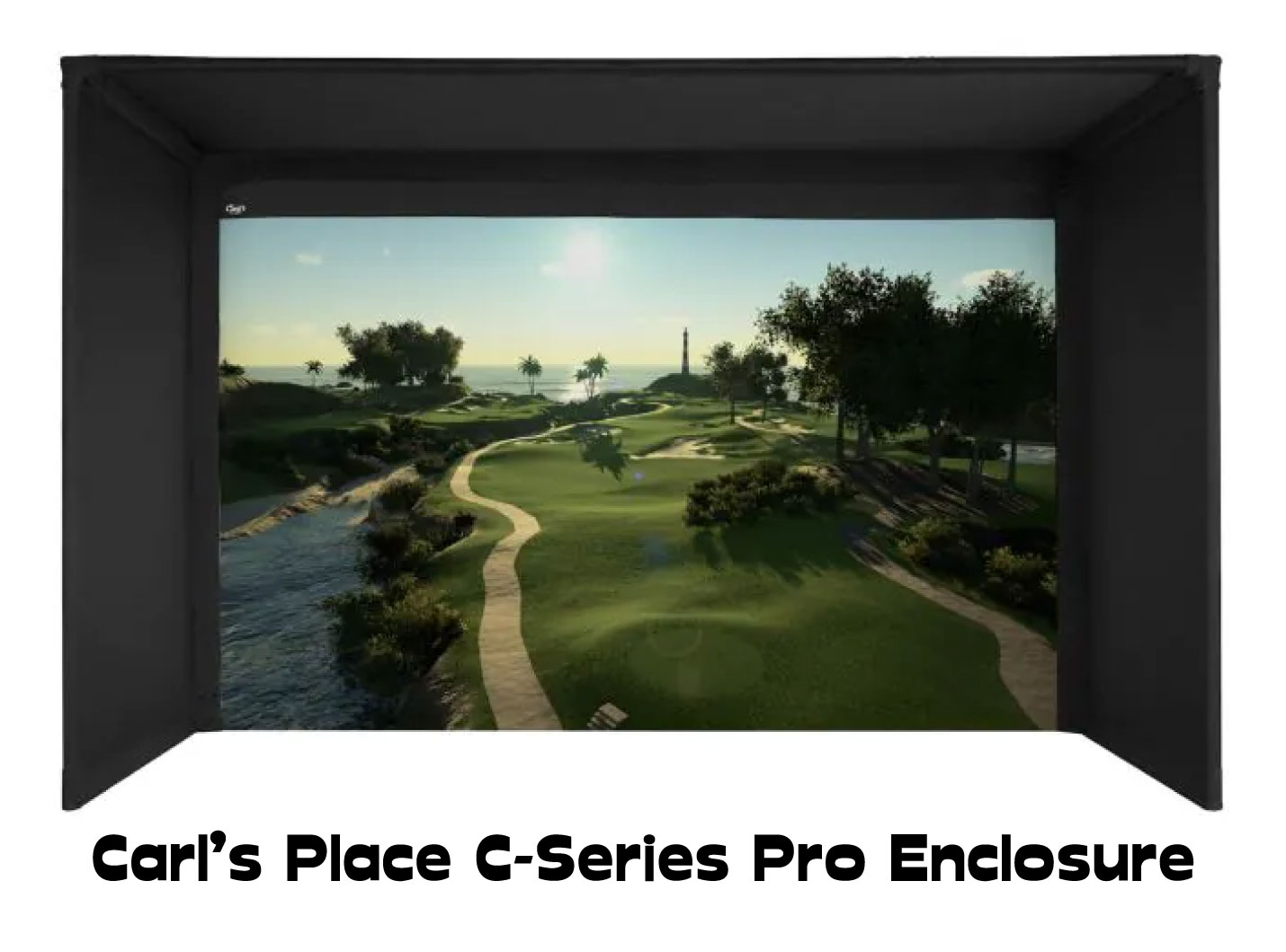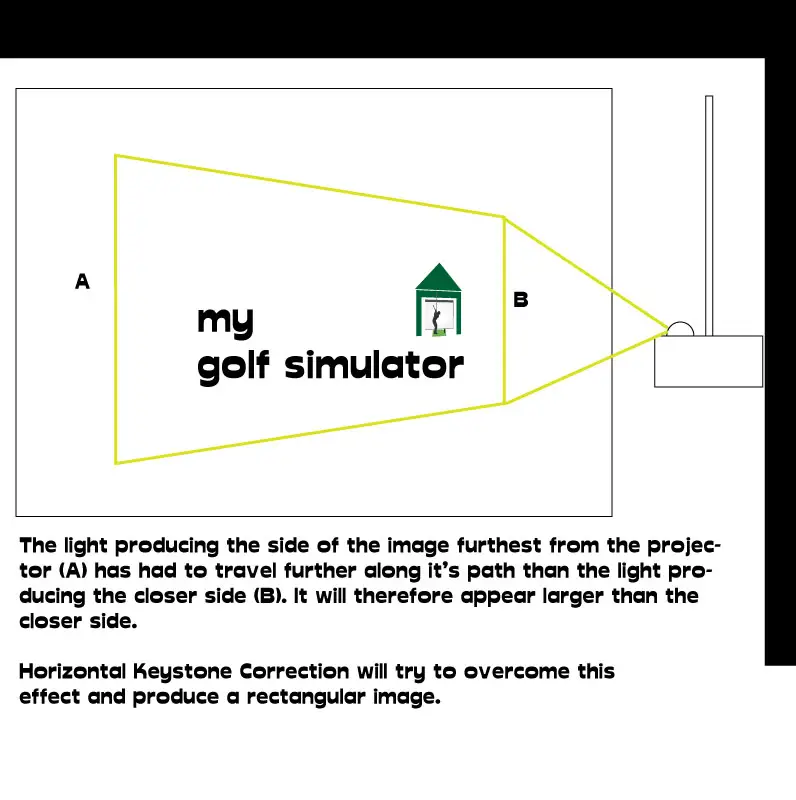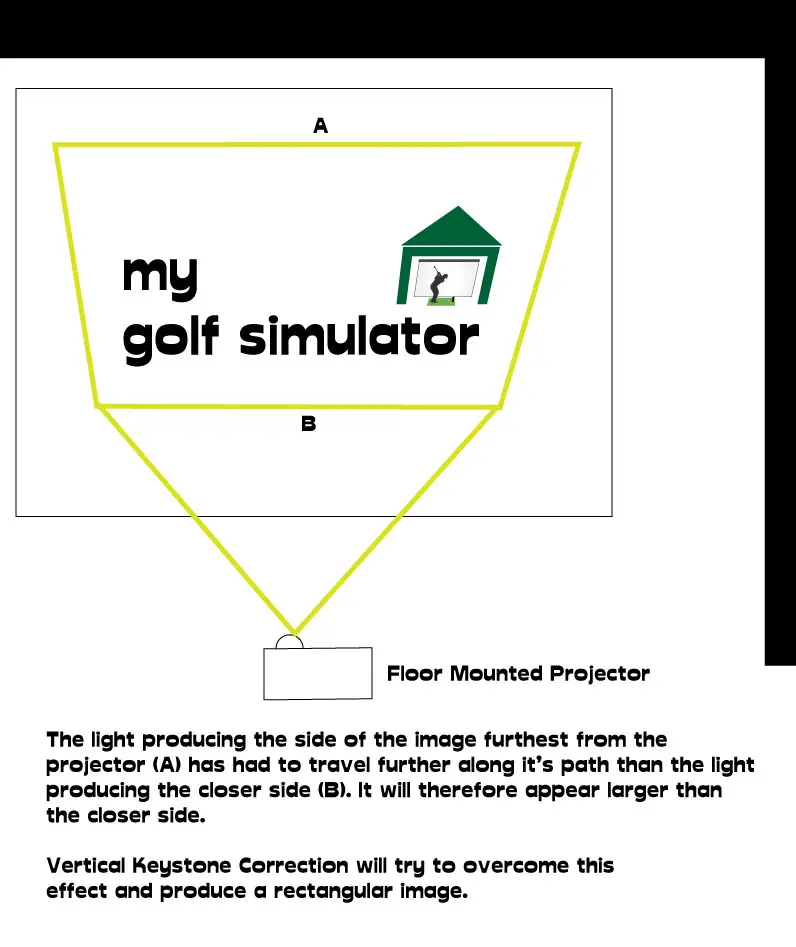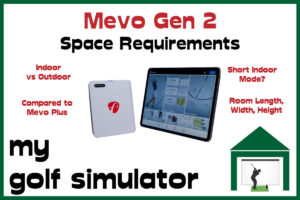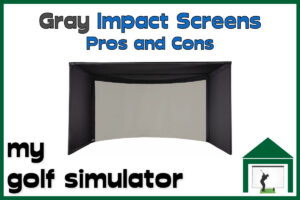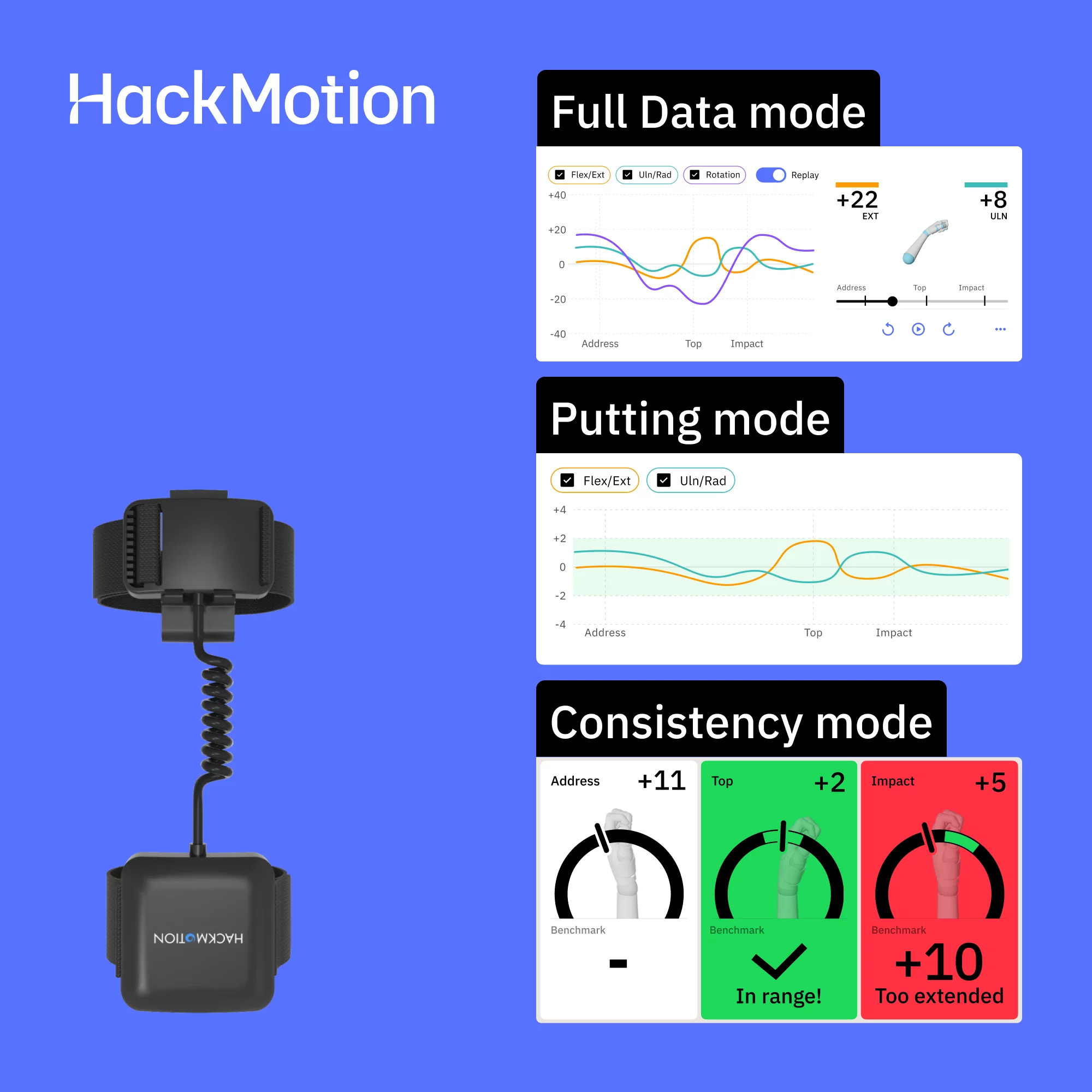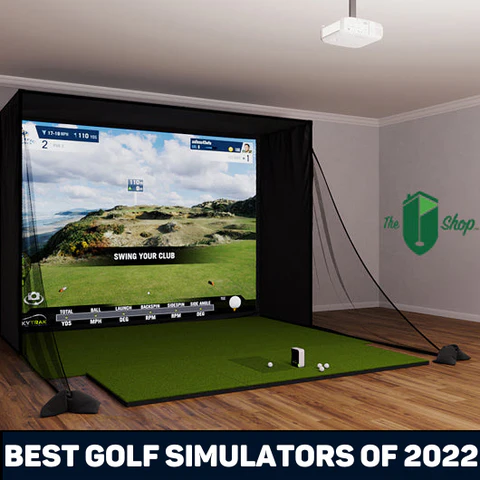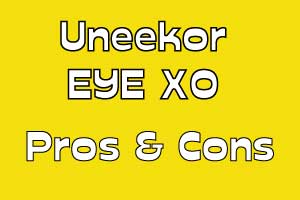4K Golf Simulator Projectors – Complete 2025 Guide
Posted in Projectors
A few years ago, a 4K golf simulator projector was out of reach for most golfers. They were rare, highly specialized, and carried price tags that only commercial setups could justify. Fast-forward to 2025, and things have changed dramatically. True 4K short-throw projectors are now not only widely available but also affordable enough to feature in many high-end home simulator builds.
Modern 4K golf simulator projectors typically combine true 4K UHD resolution (8.3 million pixels), a short-throw ratio between 0.5–0.9, and long-life laser light sources. Prices now start at under $2,000 for entry-level 4K models, while premium options with 5,000+ lumens, Golf Mode, and Auto Screen Fit technology run closer to $5,000. To unlock the full benefit of 4K, you’ll also need a high-quality impact screen and a gaming-grade PC or laptop capable of rendering 4K graphics smoothly.
| Projector Model | Buy Now | Resolution | Lumens | Throw Ratio | Contrast Ratio | Aspect Ratio (Native) | Aspect Ratios (in settings) | Golf Mode Option | Lens Shift | Keystone Correction | Light Source |
|---|---|---|---|---|---|---|---|---|---|---|---|
| BenQ TH671ST | Buy Now! | 1080p (1920 x 1080) | 3000 | 0.69–0.83 | 10,000:1 | 16:9 | Auto; 16:9; 4:3 | No | None | Vertical ±40° | Lamp |
| BenQ LU710 | Buy Now! | WUXGA (1920 x 1200) | 4000 | 1.13–1.46 | 3,000,000:1 (dynamic) | 16:10 | Auto; 16:10; 16:9; 4:3; Real | Yes | None | 2D: H/V ±30° (Corner Fit) | Laser |
| BenQ AH500ST | Buy Now! | 1080p (1920 x 1080) | 4000 | 0.499 | 3,000,000:1 (dynamic) | 16:9 | Auto; 16:9; 4:3; 16:10; Real | Yes | None | H/V ±30° | Laser |
| BenQ AH700ST | Buy Now! | 1080p (1920 x 1080) | 4000 | 0.69–0.83 | 3,000,000:1 (dynamic) | 16:9 | Auto; 16:9; 4:3; 16:10; Real | Yes | None | 3D: H/V ±30° + Rotation ±30° | Laser |
| BenQ TK710STi | Buy Now! | 4K UHD (3840 x 2160) | 3200 | 0.69–0.83 | 600,000:1 (dynamic) | 16:9 | Auto; 16:9; 4:3 | Yes | None | 3D: H/V ±30° + Rotation ±30° | Laser |
| Optoma ZH450ST | Buy Now! | 1080p (1920 x 1080) | 4200 | 0.496 | 2,000,000:1 (dynamic) | 16:9 | 16:9; 16:10; 4:3 | No | None | H/V ±30° | Laser |
| Panasonic PT‑VMZ51 | Buy Now! | WUXGA (1920 x 1200) | 5200 | 1.09–1.77 (1.09–2.21 with Digital Zoom Extender) | 3,000,000:1 (dynamic) | 16:10 | 16:10; 16:9; 4:3 | No | H ±20%, V +44% | H ±35°, V ±25° | Laser (3LCD) |
| BenQ AK700ST | Buy Now! | 4K UHD (3840 x 2160) | 4000 | 0.69–0.83 | 3,000,000:1 (dynamic) | 16:9 | 16:9; 16:10 (Auto Screen Fit) | Yes | None | 3D: H/V ±30° + Rotation ±30° | Laser |
| LG ProBeam BU53RG | Buy Now! | 4K UHD (3840 x 2160) | 5000 | 0.94–1.14 | 3,000,000:1 (dynamic) | 16:9 | 16:6; 16:9; 16:10; 21:9; 4:3 | No | H ±20%, V ±50% | Advanced edge adjustment & warping (4/9/15/25‑point) | Laser |
| BenQ LK936ST | Buy Now! | 4K UHD (3840 x 2160) | 5100 | 0.81–0.89 | 3,000,000:1 (dynamic) | 16:9 | 5 selectable (incl. 16:9/16:10/4:3/Real) | Yes | H ±23%, V ±60% | 3D: H/V ±40° + Rotation ±40°; Warping | Laser |
| EIKI EK-308U | Buy Now! | WUXGA (1920 x 1200) | 6000 | 1.07–1.75 | 10,000:1 | 16:10 | 16:10; 16:9; 4:3 | No | Vertical ±45%, Horizontal ±9% | Vertical ±30°, Horizontal ±15° | 3LCD (Lamp) |
| Optoma ZW350ST | Buy Now! | WXGA (1280 x 800) | 3600 | 0.521:1 | 300,000:1 | 16:10 | 16:10; 16:9; 4:3 | Yes | None | Vertical ±15° | Laser (30,000 hours life) |
This article will examine what to look for in a 4K golf simulator projector, the difference between 4K input support and true-4K output, and also what else you need to get right in your golf simulator in order to feature a perfect 4K image on your impact screen.

Is a 4K Short Throw Projector Available at a Realistic Price?
Only a few years ago, 4K short-throw projectors were priced far beyond what most golfers could justify. Today, costs have fallen significantly, and manufacturers now design projectors specifically with golf simulation in mind.
Modern models such as the BenQ ACE Series (AK700ST, AH700ST) deliver true 4K UHD resolution, short-throw ratios in the 0.5–0.9 range, and laser light sources — all at prices starting under $2,000. Premium models like the BenQ LK936ST still cost closer to $5,000, but they add features like Golf Mode, Auto Screen Fit, and 5,000+ lumens brightness, making them ideal for large impact screens and brighter rooms.
Dedicated Golf Mode settings now enhance greens, fairways, and skies for a more realistic playing experience, meaning you can enjoy a truly immersive 4K simulator setup without the once-prohibitive price tag.
The Difference Between True 4K and 4K Input Support
Not all projectors marketed as “4K” actually deliver true 4K resolution. This is where many golfers get caught out.
- 4K Input Support: A projector may accept a 4K signal from your computer or simulator software, but internally it downscales it to the projector’s native resolution — usually 1080p (1920 × 1080). The result looks sharper than standard HD, but it’s not true 4K detail.
- True 4K: A true 4K projector outputs a native resolution of 3840 × 2160 (8.3 million pixels). That’s four times the detail of Full HD (2.1 million pixels). On a large impact screen, this extra detail makes fairways, bunkers, and greens appear much more realistic and immersive.
In 2025, many modern golf simulator projectors like the BenQ AK700ST and LK936ST offer true 4K, while some budget models only provide 4K input support. When comparing, always check the native resolution in the specs, not just the “4K” marketing label.

Viewing Distance and Appreciating 4K Detail
Some golfers wonder if they’ll actually notice the difference between 1080p and 4K when standing 10–15 feet from the impact screen. With TVs, you often need to sit fairly close to see the benefit of higher resolutions — but golf simulators are different.
- Screen Size Matters: Most impact screens are 12–16 feet wide, often twice the diagonal size of the largest home TVs. On a surface that large, the extra pixel density of 4K (8.3 million pixels vs. 2.1 million in Full HD) remains visible, even from typical hitting distances.
- Sharper Course Detail: 4K allows you to pick out finer details like the slopes of a green, the edges of bunkers, and the textures of fairways. This realism becomes especially noticeable in modern software like GSPro and E6 CONNECT, which now render in full 4K.
- Immersion Factor: Even if you don’t consciously see “individual pixels,” the overall clarity and smoothness of motion in 4K make the experience feel more lifelike — particularly important for dual-use golf rooms also used for movies or gaming.
Bottom line: At golf simulator screen sizes, you will benefit from 4K resolution at normal hitting distances. The upgrade is worth it if you want maximum realism and future-proof performance.
Golf Mode in a Golf Simulator Projector
Modern golf simulator projectors are now being built with golfers specifically in mind — and Golf Mode is the clearest example.
BenQ pioneered this feature with the LK936ST, and in 2025 it’s been expanded across their dedicated ACE Series projectors (AK700ST, AH700ST, AW30ST). Golf Mode fine-tunes color output to correct the oversaturated blues and purples that can appear on laser projectors, ensuring that fairways look lush green and skies look natural.
- Corrects purple/blue fringing common in golf software.
- Boosts realism by enhancing grass, water, and sky tones.
- Now standard on BenQ’s golf-specific lineup, not just a single premium model.
If your simulator doubles as a home theater, you can still switch between Golf Mode and standard modes, giving you flexibility for movies, gaming, or streaming.
Takeaway: Golf Mode isn’t a gimmick — it’s a practical feature that makes simulator visuals more immersive, especially on large impact screens where subtle color imbalances are magnified.

What Else Needs to Be Considered in a 4K Golf Simulator?
It’s Not Just the Projector That Needs to Be 4K-Ready
Buying a premium 4K short throw projector is only part of the equation. If the rest of your simulator setup isn’t optimized, you won’t see the full benefit of those extra pixels. Your aspect ratio, impact screen, and PC hardware all need to work in harmony.
Aspect Ratios and 4K
- Native 4K is 16:9 (3840×2160). To get true clarity, your projector, software (e.g. GSPro, E6 CONNECT), and screen must all match this aspect ratio.
- If you try to force a 4K projector into a 4:3 screen, the image will be cropped or distorted — wasting detail and reducing ROI on your investment.
- If your space only allows for a 4:3 setup, you may be better off with a high-quality 1080p projector and a brighter screen rather than overspending on 4K.
Impact Screen Quality
A 4K image is only as good as the surface it’s projected onto. Low-grade screens (like archery baffles or loosely woven polyester) scatter light, show visible texture, and wash out color.
Premium golf impact screens now feature:
- Tightly woven, multilayer polyester for smooth image surfaces.
- High-gain reflective coatings for brighter, sharper projection.
- Cushioned cores to reduce ball bounce-back and increase durability.
For example, Carl’s Premium Impact Screen is widely regarded as one of the best for 4K projection, maximizing brightness and sharpness while holding up to thousands of shots.
Bottom Line
Think of your 4K setup as a chain — projector, aspect ratio, screen, and PC all need to be strong links. Miss one, and your “4K” experience may look little better than HD.
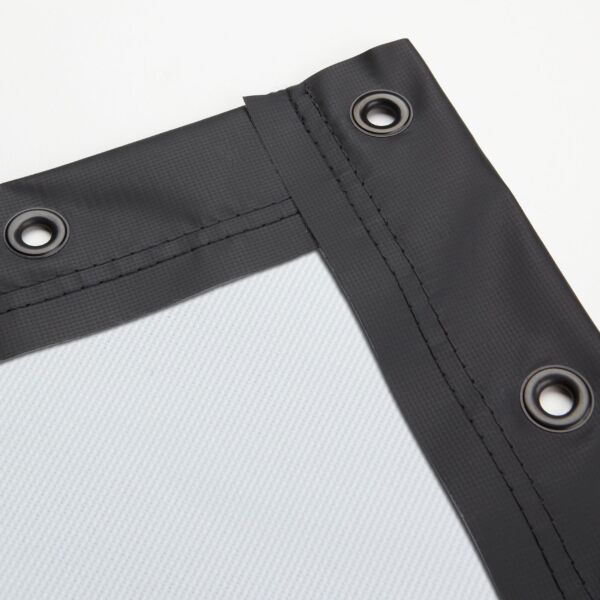
Ambient Light and Brightness
To fully enjoy the sharpness of a 4K golf simulator projector, you need an image that remains bright and vivid even under less-than-ideal lighting. Brightness is measured in ANSI lumens, and it’s just as important as resolution when it comes to real-world clarity.
Why Brightness Matters
- Ambient light is the biggest challenge. Any light leaking into your room — from windows, skylights, or overhead fixtures — will wash out contrast and dull the image.
- Higher lumens = more flexibility. A bright projector allows you to keep some lights on (useful for coaching, filming, or putting practice) without sacrificing image quality.
- Dark rooms aren’t required. While some golfers prefer hitting in near-darkness for maximum brightness, today’s projectors make it possible to keep your space usable for more than just golf.
Recommended Brightness Levels (2025)
- Minimum: 3500-4,000 ANSI lumens for most home golf simulators.
- Optimal: 5,000+ ANSI lumens for setups with larger screens (12ft+) or moderate ambient light.
👉 The latest BenQ and Optoma 4K short throw projectors exceed 5,000 lumens, combining laser light sources with advanced color tuning for bright, accurate images even on large impact screens.
44K Golf Simulation Programs – Computer and Graphics Power
A 4K golf simulator projector is only as good as the computer driving it. If your PC can’t render simulation software in true 4K, you won’t get the crisp detail you paid for — no matter how advanced your projector or impact screen is.
GPU and Graphics Requirements
Running programs like GSPro, TGC 2019, E6 CONNECT, or FSX 2020 in 4K resolution places heavy demands on your graphics card.
- Entry-level for 4K: NVIDIA RTX 3060 Ti or AMD RX 6700 XT — capable of 4K play at medium settings.
- Recommended baseline: NVIDIA RTX 4070 / 4070 Ti or AMD RX 7800 XT — handles most golf sim software smoothly at 4K, 60Hz.
- Premium tier: NVIDIA RTX 4080 / 4090 — allows you to max out all detail sliders (shadows, grass textures, water reflections) at 4K with high frame rates, future-proofing your setup.
CPU, RAM, and Refresh Rates
- CPU: A modern 6–8 core processor (Intel 12th gen i5/i7 or AMD Ryzen 5/7 5000-series and above) ensures smooth calculations and minimal stutter.
- RAM: 16GB is the minimum; 32GB is ideal if you also stream, record, or run multiple apps alongside your simulator.
- Refresh Rate: Realistic expectations for 4K are 60Hz. If you prefer ultra-smooth gameplay (120Hz+), consider dropping resolution to 1080p or 1440p depending on your GPU.
Fine-Tuning Settings
Most golf sim programs allow you to adjust:
- Render scale (how much detail is drawn per frame)
- Object detail (trees, flags, clubhouse textures)
- Lighting/shadows (sun position, cloud layers, reflections)
Tuning these settings lets you balance performance and image quality, especially if you’re using a mid-range GPU.
💡 Tip: If your budget doesn’t stretch to an RTX 4080/4090, pair a 4070 Ti with a well-optimized 4K projector. You’ll get superb results without overspending.
4K Golf Simulator Projector Placement
Lens Shift and Keystone Correction – Why They Matter
One of the biggest advantages of premium 4K projectors is their advanced installation flexibility. Features like wide-range lens shift and 3D keystone correction give you freedom in mounting, solving common headaches such as:
- Avoiding shadows on the screen
- Preventing the projector from being struck by your swing
- Working around low ceilings or narrow spaces
Lens Shift vs. Keystone Correction
- Lens Shift (optical): Moves the lens inside the projector without tilting the unit, letting you adjust the image vertically and horizontally while keeping resolution intact.
- Keystone Correction (digital): Adjusts the image shape when the projector is angled off-center, fixing trapezoidal distortion but with a slight reduction in image clarity.
💡 Best Practice: Use lens shift whenever possible for the sharpest results. Reserve keystone correction for smaller adjustments or tricky placements.
Modern Examples (2025)
- BenQ LK936ST: Offers both vertical and horizontal lens shift, plus 3D keystone with Corner Fit Correction, allowing you to fine-tune each corner of the image for a perfectly squared projection.
- BenQ AK700ST (2025): Includes Auto Screen Fit, which uses sensors and AI to automatically detect screen edges, apply lens adjustments, and correct geometry within seconds.
- Optoma ZK608TST: A laser-based 4K short-throw model with strong vertical shift, ideal for ceiling or floor mounting.
Things to Keep in Mind
Always check your projector’s specifications — horizontal lens shift and advanced geometric correction are usually only available on mid-to-high-end models.
Relying heavily on keystone correction alone (e.g., mounting far off to the side) may slightly soften the image, especially at 4K resolution.
Combining lens shift with minor keystone correction is often the sweet spot for difficult rooms.
Where should you mount your 4K Golf Simulator Projector?
The features described above such as lens shift and 3D keystone correction allow you great flexibility in your golf simulator projector placement.
For example, you can use the 3D keystone correction in the BenQ LK936ST to allow mounting the projector above and significantly to the side of the center. The projector could face the screen head-on in this position and lens shift could bring the image back to the middle of your impact screen.
Alternatively, 3D keystone correction can help if you turn the projector to aim the lens toward the center of the screen.
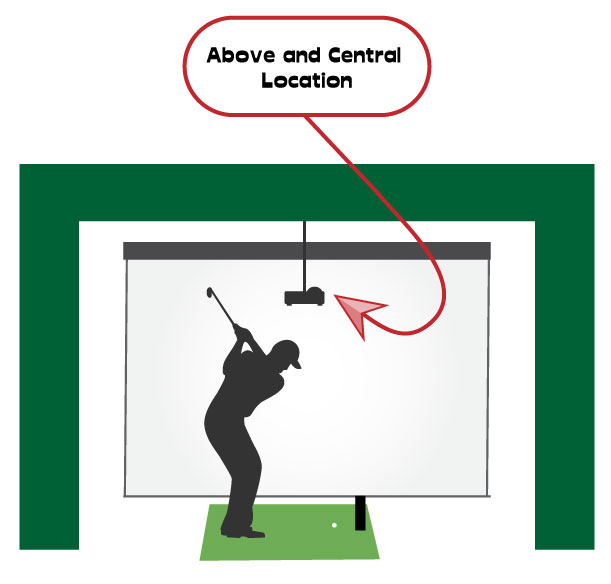
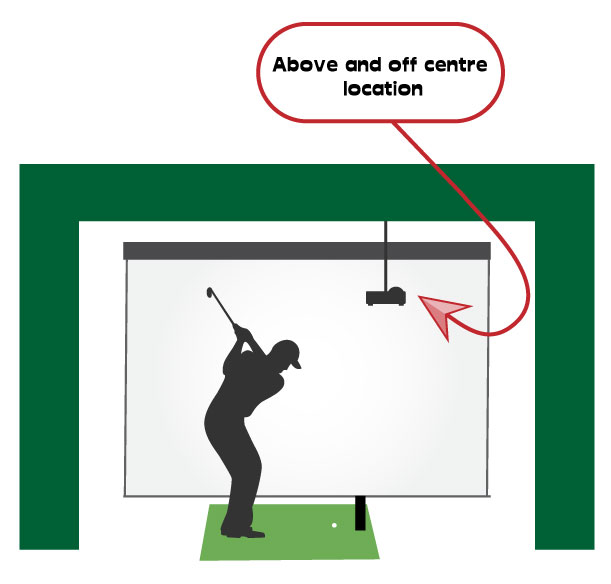
You can learn lots more about the different mounting positions of golf simulator projectors by reading my in-depth post here.
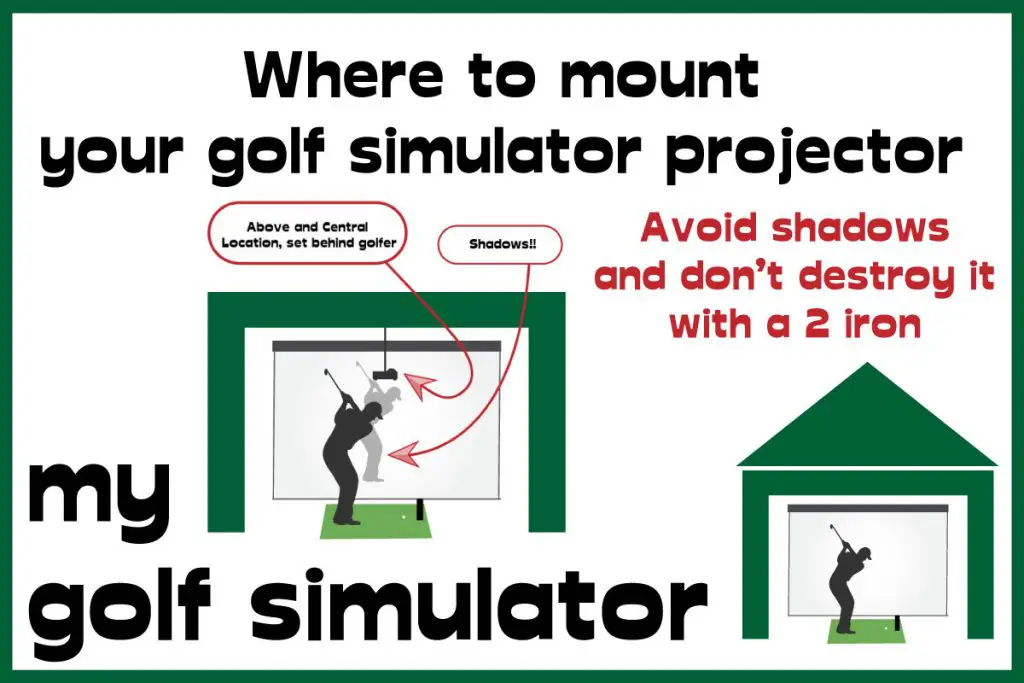
Throw Ratio in a Golf Simulator Projector
The throw ratio of a projector determines how far the unit must be placed from your impact screen to produce the correct image size. It’s defined as:
Throw Ratio = Throw Distance ÷ Horizontal Image Width
So, to calculate your projector placement:
Throw Distance = Throw Ratio × Horizontal Screen Width
Why Throw Ratio Matters
For golf simulators, a short-throw projector (throw ratio between 0.4 and 1.0) is essential. This ensures:
- The projector isn’t mounted too close to the screen, where it risks damage from golf balls.
- The projector isn’t mounted too far behind you, where it could cast distracting shadows.
Example Calculation
Take the BenQ LK936ST (throw ratio 0.81–0.89).
- For a 14 ft–wide impact screen, the mounting distance should be:
14×0.81=11.314 × 0.81 = 11.314×0.81=11.3 feet.
That’s the optimal placement to fill the screen with a clean 16:9 image.
👉 For quick, visual setup planning, use the excellent ProjectorCentral calculator — it shows exactly how image size and throw distance work for each model.
Flexibility Features (2025)
Modern 4K golf simulator projectors come with tools that make mounting less stressful:
- Lens Shift (Vertical + Horizontal): Lets you move the image without moving the projector.
- 3D Keystone & Corner Fit: Corrects trapezoidal images when the projector isn’t centered.
- Auto Screen Fit (BenQ AK700ST, 2025): Uses sensors and AI to detect screen edges and auto-adjust the image in seconds.
💡 Tip: If your room dimensions are tight, prioritize models with wide throw ratio ranges (0.5–0.9) and strong installation features. This gives you more flexibility to mount safely while still filling your impact screen.
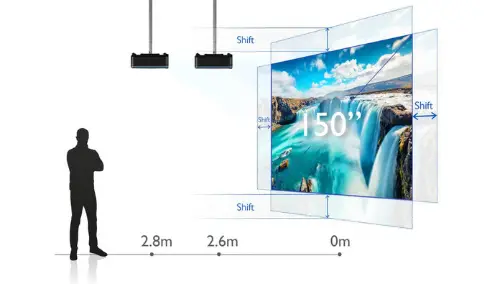
6 More Important Golf Simulator Projector Considerations
1. Laser vs. Lamp Projectors (Longevity & Maintenance)
Most modern 4K short-throw golf simulator projectors use laser light sources instead of traditional lamps. Laser projectors offer several advantages:
- Longevity: A typical lamp lasts 3,000–5,000 hours before dimming, while lasers last 20,000+ hours — that’s 4 hours of use every day for over 13 years.
- Consistent Brightness: Lasers maintain brightness levels far better than lamps, avoiding the gradual dimming that plagues lamp-based models.
- Low Maintenance: Laser projectors like the BenQ LK936ST and AK700ST use sealed optical engines with IP5X dustproofing, reducing the risk of dust-related color decay or sensor failure.
- Instant On/Off: No warm-up or cool-down needed, unlike lamps.
For a ceiling-mounted golf simulator projector, this low-maintenance, long-lifespan design is a game changer.
2. Contrast Ratio in Golf Simulators
Contrast ratio describes the difference between the darkest black and the brightest white a projector can display. While numbers like 3,000,000:1 (as in the LK936ST) sound impressive, real-world performance depends more on ambient light control and your impact screen quality.
- Aim for at least 2,000:1 native contrast for clear detail.
- In golf simulators, brightness (lumens) and screen reflection often matter more than ultra-high contrast specs.
- Still, a higher contrast ratio can help you better distinguish course details like slopes, sand texture, and rough.
3. Protecting Your 4K Projector
A golf ball strike could end your investment instantly. To keep your projector safe:
- Use a purpose-built enclosure such as SwingShield or ProTurf enclosures for floor or ceiling setups.
- DIY protection is possible (wood or plastic casing with ventilation), but ensure airflow is maintained to prevent overheating.
- Always check that your insurance policy covers simulator use — many standard gadget or home insurance plans exclude “sports use” unless declared.
4. Dual-Purpose Use: Home Theatre + Golf Simulator
One of the best perks of investing in a true 4K projector is multi-purpose entertainment:
- Watch movies, stream sports, or play console games on a 200″+ screen with the same setup.
- Many modern golf projectors, like BenQ’s ACE Series, support HDR10, HLG, and Rec.709 color accuracy, making them excellent for cinema-quality images.
- Ports such as S/PDIF and HDMI eARC allow integration with 5.1 surround sound systems for a true home theatre experience.
With most simulator rooms now used for multiple activities (71% of owners in 2025 use their sim space beyond golf), this dual role is becoming a key factor in projector selection.
5. Value for Money
A 4K golf simulator projector can be one of the most expensive parts of your build, sometimes rivaling the cost of the launch monitor. Is it worth it?
- Yes, if: you prioritize realism, plan to use your simulator space for both golf and entertainment, and have a premium impact screen to show off the detail.
- Maybe not, if: you’re limited to a 4:3 impact screen or play in a bright room where even 4K won’t shine. In that case, a bright 1080p laser projector may give you better ROI.
6. Impact Screen Quality
Don’t bottleneck a $3,000–$5,000 projector with a poor-quality screen:
- Cheap or archery-grade screens have visible holes that bleed light.
- A multi-layer, tightly woven polyester screen with a bright reflective front surface is essential to maximize clarity.
- Premium screens, such as Carl’s Place Premium Impact Screen, are designed to reflect 4K detail while still cushioning shots to reduce bounceback.
✅ Bottom line: A 4K short-throw laser projector is a sound investment if you optimize the rest of your setup — from screen quality and room lighting to protection and insurance. Combined with today’s features like Auto Screen Fit and Golf Mode, these projectors can deliver the most immersive golf simulator experience ever.
Conclusion – 4K Golf Simulator Projector Main Considerations
4K short-throw projectors are no longer an unattainable luxury—they’ve become a realistic option for serious golf simulator builds in 2025. With true 4K UHD resolution, these projectors deliver crisp detail, vibrant colors, and lifelike course rendering that make a huge difference on large impact screens.
But remember: a projector alone won’t guarantee a premium experience. To get the most from your investment, you’ll need:
- A high-quality impact screen capable of reflecting fine detail without image bleed.
- A capable computer and GPU that can run golf simulation software at 4K with smooth frame rates.
- A room setup with controlled ambient lighting to maintain brightness and contrast.
If you already have these foundations in place, upgrading to a 4K short-throw projector can transform your simulator—and double as a stunning home theater setup when you’re not practicing.
Best 4K Short-Throw Projectors for Golf Simulators (2025)
Based on the latest specs and features, here are the top choices:
- BenQ AK700ST – Purpose-built for golf simulators with Auto Screen Fit and Golf Mode. A fantastic all-rounder for most home setups.
- BenQ LK936ST – A premium option with 5100 lumens of laser brightness, perfect for larger rooms or environments with ambient light.
- LG ProBeam BU53RG – A strong alternative with 5000 lumens and excellent optics, though it requires slightly more throw distance.
These projectors combine the short throw flexibility, brightness, and 4K sharpness that golf simulators demand. Choose the one that best fits your room dimensions, budget, and setup style—and enjoy a simulator experience that rivals the real thing.
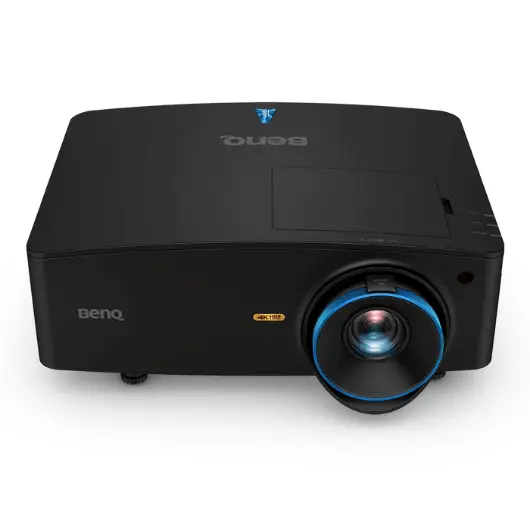
4K Golf Simulator Projectors – FAQs
Q: Do I really need a 4K projector for my golf simulator?
Not always. A good 1080p projector can look excellent, especially in smaller setups. But with larger screens (12–14 feet wide) and modern software like GSPro or TGC 2019, true 4K resolution makes details like fairway textures, slopes, and ball flight look far more realistic.
Q: What’s the difference between true 4K and “4K input support”?
True 4K projectors output 3840×2160 pixels (8.3 million), while “4K input support” projectors downscale the signal to 1080p (2.1 million pixels). If you want full detail, make sure your projector specifically lists native 4K UHD resolution.
Q: How much should I expect to spend on a 4K golf simulator projector in 2025?
Prices have dropped significantly. Entry-level 4K short-throw models start at under $2,000, while high-brightness laser projectors with golf-specific features (like the BenQ LK936ST) range between $4,000–$5,500.
Q: Is brightness more important than resolution?
Both matter, but brightness (lumens) is often the deciding factor. A 4K projector with only 2,500 lumens will look washed out in a lit room. Aim for at least 4,000 lumens, or 5,000+ lumens if you’ll have ambient light.
Q: What is Golf Mode on a projector?
Golf Mode is a special color preset designed for golf simulation. It corrects common issues like blue/purple tints and enhances greens and blues, making courses look natural and immersive. Models like the BenQ AK700ST and LK936ST include it.
Q: Can I floor-mount a 4K projector, or should I stick to ceiling mounting?
Both work. Floor mounting is popular in low-ceiling rooms but requires a protective enclosure to guard against ball strikes. Ceiling mounting keeps the projector out of the way but requires careful alignment. Most modern 4K models include Auto Screen Fit and lens shift features to make setup easier either way.
Q: What GPU do I need to run golf sims in 4K?
A mid-to-high-end graphics card is essential. An NVIDIA RTX 3070 or higher is recommended for smooth 4K play at 60Hz. Entry-level GPUs may struggle with higher settings like shadows, water effects, and detailed object rendering.
Q: Are lamp-based 4K projectors still worth buying?
Not really. Lamp projectors are being phased out (EU bans mercury lamps from 2027). Laser projectors now dominate the market, offering 20,000+ hours of lifespan, consistent brightness, and low maintenance.
Q: Can I use my 4K golf sim projector for movies and gaming too?
Yes! In fact, 71% of golfers use their simulator rooms for dual purposes (movies, sports, gaming). A 4K short-throw projector doubles as a huge home theater screen, especially if you’ve already invested in a premium impact screen.
Q: What’s the best throw ratio for a 4K golf simulator projector?
Look for a short throw ratio between 0.5 and 0.9. This ensures the projector sits close enough to avoid shadows but far enough to stay clear of your swing.
Mevo Gen 2 Space Requirements
Gray Impact Screens – Pros and Cons
ABOUT THE AUTHOR
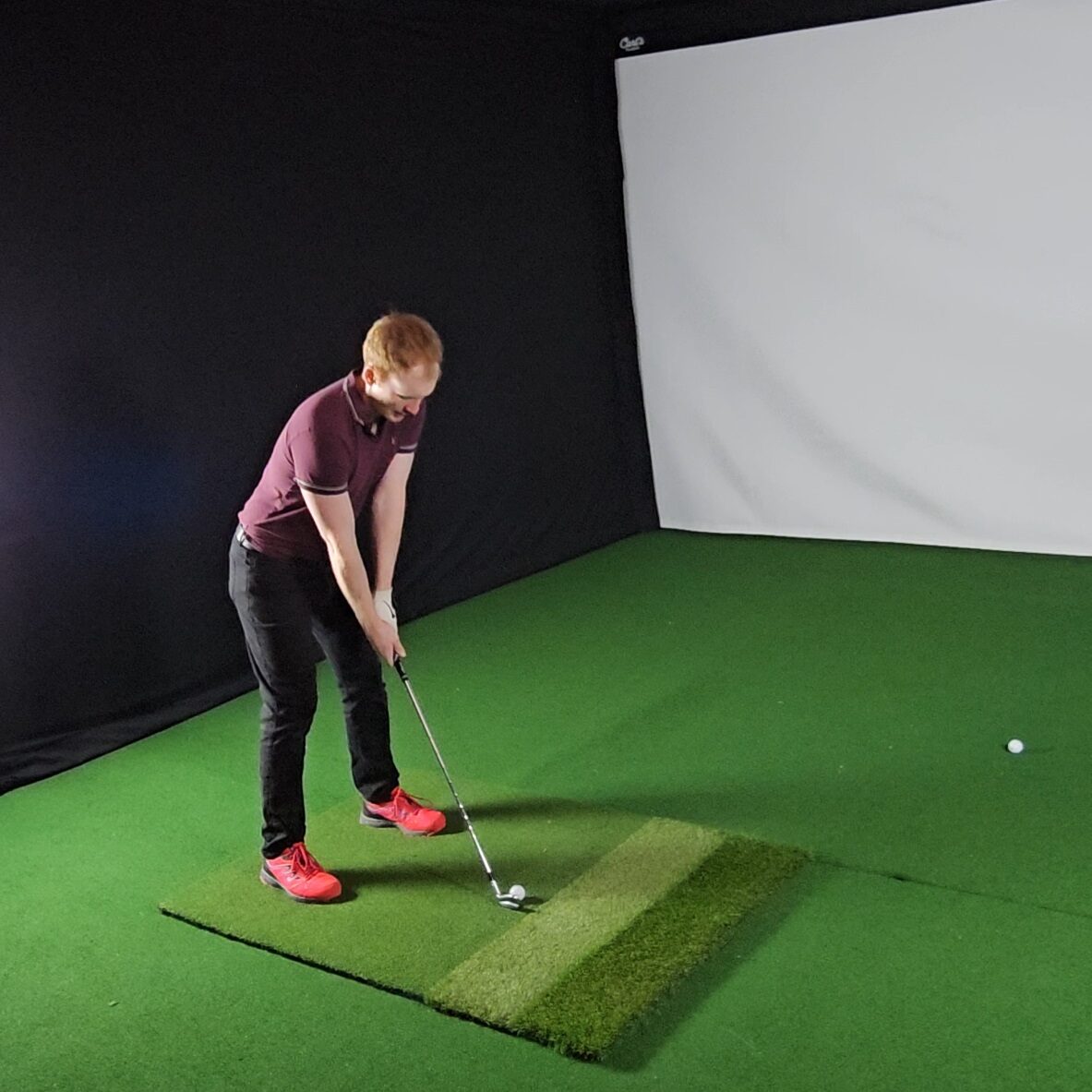
Hello! My name is Alex and it is my mission to bring you all the information you need to build your own home golf simulator! I hope mygolfsimulator.com helps you on your journey to better golf at home!
LEGAL INFORMATION
On this site, you'll find articles on all aspects of building a golf simulator. I will also link to other sites where you can buy some of the simulator components. Some of these links may be affiliate links, which means if you click them I gain a small commission at no extra cost to you. This really helps out me and my site so thank you in advance! mygolfsimulator.com and all related social media accounts are property of Awonline LTD.
